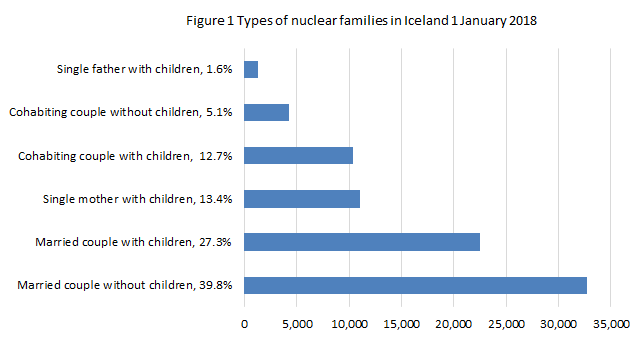The total population 1 January 2018 was 348,450 and grew by 10,101 from the previous year, a 3% rise. The number of men (177,600) increased by 3.8% while the number of women (170,850) increased by 2.1%. Proportionally the population growth was highest in the region of Southwest (7.4%), 1,777 persons. The population increased by 2.6% in the Capital region (5,606 persons) and did not decline in any region of Iceland, the smallest increase being in the Northwest (0.5%).
Nine municipalities with more than 5 thousand inhabitants
The number of municipalities was 74, same as in the previous year. Seven municipalities had fewer than 100 inhabitants, 40 had fewer than 1,000 inhabitants and only nine municipalities had more than 5,000 inhabitants.
Families
The number of nuclear families, i.e. couples with or without children under the age of 18 years or single parents with children under 18 years, was 82,102 on 1 January 2018, compared with 80,638 families one year earlier. The distribution of the main types of nuclear families is presented in the following figure.

Dependency ratio
The dependency ratio was 65.8% compared with 67.4% last year. The dependency ratio is calculated as the ratio of the young and old age population relative to the working age population (defined as 20–64 years of age).
Methods
The definition of localities and urban nuclei is in alignment with international recommendations, especially that of the Commission Regulation (EC) No 1201/2009 implementing Regulation (EC) No 763/2008 of the European Parliament and of the Council on population and housing censuses as regards the technical specifications of the topics and of their breakdowns.